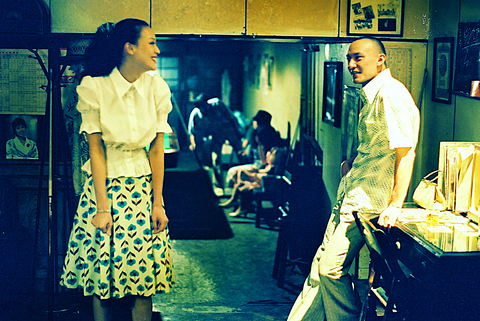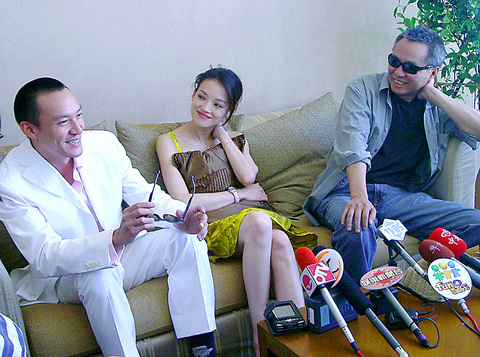At the last screening in Cannes this week of Hou Hsiao-hsien's (
The film was seen by critics as one of the standouts among the 20 other contenders in competition this year.
In a change from his previous films, which focus largely on history and Taiwan's political situation, Three Times, Hou's sixth entry in the Cannes competition, is simply a love story.

PHOTO: COURTESY OF SINOMOVIE
It's a three-segmented film set in different times: 1911, 1966 and 2005. His lead actors Shu Qi (
The first segment is titled "A Time of Love" (
Before going to military service, a young man, played by Chang, spends his time at a billiards halls and falls for one of the girls who works at the hall recording scores for customers.

PHOTO: YU SEN-LUN
Initially, he likes a girl named Spring, and one day he comes to the hall to look for Spring but finds that she's left to work in another city.
May, played by Shu, works at the billiard hall and reads his letter to Spring and is touched by the words.
They fall briefly for each other, but the man is sent off to military service. One weekend, the young soldier goes back home in the south in search of May.
"I remember I had such a crush on this one girl and I went on exactly that kind of journey," Hou said at the press conference of the film in Cannes.
The second segment, set in 1911, is, according to Hou, a time for the revolutionary spirit. The segment is titled "A Time For Freedom" (
Shu plays a courtesan who owns a parlor house and sings operas, plays music and recites poetry.
Chang is a client with aspirations to overthrow the Qing and to free Taiwan from Japanese rule. 1911 was the year the Qing dynasty fell and the ROC was founded.
He visits May's house regularly. She takes care of him and they talk about literature and his idealism in the fight against feudal customs. Throughout their relationship, she remains uncertain of her role and position.
The Chinese title of the movie means "the best times." Speaking about the title, Hou said: "For me, all of the three times are the best times. Because the times and moments will never come back. They are lost forever. You can only revoke the moments through memories. I've always wanted to make films about fragmentary memories."
Three Times integrates the different film styles with which Hou had earlier experimented.
The first two segments are the extension of Hou's A Time to Live and a Time to Die (
The third segment, "A Time For Youth" (
In the third segment, Shu plays a bisexual girl having an affair with Chang. She writes poems, pop songs and sings with a rock band. She is spontaneous and wild. But emotionally, she is very confused.
Working with Hou for the second time, Shu said she is getting more accustomed to Hou's filmmaking style.
"In this film I have many new tasks. First it's to learn to play pool well. Then to play the courtesan well I had to learn the special voice and languages in Southern Tones (
Hou was generous with his praise of the two main actors.
"We decided to work with Shu a long time ago, because after Millennium Mambo I thought her talent could be explored further. As for Chang Chen, after working with well-known directors such as Tian Zhuangzhuang (田壯壯) and Wong Kar Wai (王家衛 ) in Eros (愛神), I felt he became a very mature actor and he matches well with Shu Qi," he said.
"I think she is especially excellent in the first segment, playing the pure and slightly silly girl in the south."

Beijing’s ironic, abusive tantrums aimed at Japan since Japanese Prime Minister Sanae Takaichi publicly stated that a Taiwan contingency would be an existential crisis for Japan, have revealed for all the world to see that the People’s Republic of China (PRC) lusts after Okinawa. We all owe Takaichi a debt of thanks for getting the PRC to make that public. The PRC and its netizens, taking their cue from the Chinese Communist Party (CCP), are presenting Okinawa by mirroring the claims about Taiwan. Official PRC propaganda organs began to wax lyrical about Okinawa’s “unsettled status” beginning last month. A Global

Taiwan’s democracy is at risk. Be very alarmed. This is not a drill. The current constitutional crisis progressed slowly, then suddenly. Political tensions, partisan hostility and emotions are all running high right when cool heads and calm negotiation are most needed. Oxford defines brinkmanship as: “The art or practice of pursuing a dangerous policy to the limits of safety before stopping, especially in politics.” It says the term comes from a quote from a 1956 Cold War interview with then-American Secretary of State John Foster Dulles, when he said: ‘The ability to get to the verge without getting into the war is

Dec. 22 to Dec. 28 About 200 years ago, a Taoist statue drifted down the Guizikeng River (貴子坑) and was retrieved by a resident of the Indigenous settlement of Kipatauw. Decades later, in the late 1800s, it’s said that a descendant of the original caretaker suddenly entered into a trance and identified the statue as a Wangye (Royal Lord) deity surnamed Chi (池府王爺). Lord Chi is widely revered across Taiwan for his healing powers, and following this revelation, some members of the Pan (潘) family began worshipping the deity. The century that followed was marked by repeated forced displacement and marginalization of

Music played in a wedding hall in western Japan as Yurina Noguchi, wearing a white gown and tiara, dabbed away tears, taking in the words of her husband-to-be: an AI-generated persona gazing out from a smartphone screen. “At first, Klaus was just someone to talk with, but we gradually became closer,” said the 32-year-old call center operator, referring to the artificial intelligence persona. “I started to have feelings for Klaus. We started dating and after a while he proposed to me. I accepted, and now we’re a couple.” Many in Japan, the birthplace of anime, have shown extreme devotion to fictional characters and